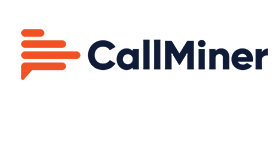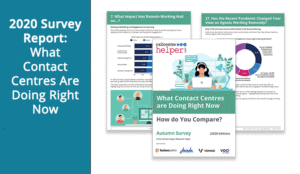CallMiner introduce their top twelve best practices for improving contact centre performance and customer satisfaction.
There’s an imperative for call centres to drive operational performance excellence in order to remain competitive in the industry.
Not doing so risks losing valuable customers and call centre talent in an industry that’s already known for high agent attrition rates.
But the question is: How?
The following is a look at 12 call centre best practices that can help to retain top talent and provide for an improved experience for customers:
1. Include Fun Tasks and Assessments When Interviewing
Agents are at the heart of any call centre, considering they’re on the front lines of customer interaction. As such, it’s important to hire talent that will represent the company in a positive manner, motivate other agents, and drive performance that will make a difference in business growth.
Call Centre Helper recommends instituting a “competency-based approach” to interviewing, which involves running an assessment centre for new recruits.
In essence, this structured interview process allows a group of candidates to work through tasks and assessments; it also gives those in charge of hiring the opportunity to select the best performers in the group and train them together to become new call centre agents.
2. Leverage Call Monitoring and Scoring
Following the agent interview and selection process, managers should be keyed into how best to facilitate ongoing agent support, growth, and training.
Quality monitoring software, such as speech analytics, automatically monitors and scores 100% of calls, helping managers deliver objective feedback and improve agent performance.
Call scoring evaluation forms can also be helpful for enhancing quality assurance within the call centre.
3. Effectively Communicate With Agents
In addition to call monitoring and scoring, managers and supervisors should also make it a point to schedule in time for targeted coaching sessions with agents.
The advantages are two-fold: Managers get to share ideas for agent performance improvements and agents get to communicate their thoughts and impressions of their performance.
One best practice recommended by experts is to have the agent discuss what they believe to be their strengths and weaknesses during coaching sessions.
Two-way dialogue makes the communication and coaching more collaborative and, by giving the agent a sense of empowerment and ownership over their success, can often be more effective compared to standard coaching practices.
4. Incorporate Customer Feedback Into Performance Improvements
It’s not just agents who should be the focus of call centre improvements, however. Sometimes the best resource for feedback on company experiences and interactions is a company’s customers.
The problem is that many customers don’t voice their satisfaction if they’re not asked for their feedback. In fact, just one out of 26 customers will complain about a poor experience, and 91% of customers who don’t complain will simply leave if they have a bad experience.
More than one out of 10 of those unhappy customers will tell 15 or more people about their negative experience.
The key takeaway is to use customer feedback (surveys, social media, etc.) to reduce customer churn and make changes that will help to improve customer satisfaction in the future.
5. Focus on the Metrics That Matter Most
Keeping track of call metrics and agent KPIs is a good way of maintaining a high level of performance in the call centre. However, you should be careful not to measure too much so you don’t end up drowning in metrics and data. You have many metrics at your disposal; be sure you only focus on what matters.
The metrics you should prioritize are those which measure service level, call resolution, average handle time, agent schedule adherence, call abandonment, average hold time, and call abandonment.
6. Avoid Negative Language
In general, call centre best practices include the creation of a script which recommends professional language, an upbeat tone, and key phrases to leverage. However, it is also worth training agents to avoid certain phrases and types of language to avoid negative interactions.
For example, instead of telling a caller, “I’m going to put you on hold”, encourage agents to use phrases like “I’m sorry, I’m actually not the best person to answer your query, but let me transfer you to our resident expert who will be with you in two minutes. Thanks for your patience.”
7. Train Your Agents Effectively
Effective training is probably the most obvious call centre best practice, but it is definitely an area that could be improved on at many organizations. Training your agents to perform at a high level is the foundation of your organization and the entire training process should be treated with appropriate care.
Call centre training for new recruits often lasts for about six weeks, where new agents spend time on theory as well as practicing calls with their managers. Training, however, should not be viewed as a one-time thing. Instead, you should incorporate regular coaching sessions into your processes to help underperforming agents.
Leverage best practices from your top performing agents to get other team members up to their level. Speech analytics software that tracks 100% of agent calls can help you identify the phraseology used during successful calls. Use this vital intelligence to help underperformers.
8. Vary Training for Retention
In addition to incorporating all necessary training elements in your regimen, it helps to change up how your new agents (and even experienced ones) learn. Classroom-style learning, practice calls, and computer-based quizzes are great for consistently conveying important information, but not the best for retention. There are a number of ways to vary training, including:
- Gamification: Turn the information into a game by tracking progress, having a trivia contest or even creating a game for the team to play.
- Role-playing: Practice calls with managers are important, but what if you allowed more experienced agents to throw “real-world” common curve balls to new agents? Doing this will build camaraderie while better training your staff.
- Cross-training: In many call centres, there are specialty agents for specific issues. These teams are often smaller than the pool of general reps. Cross training allows for a happier and well-rounded team.
9. Outline and Share a Career Progression Path
Agents who feel their career prospects are limited will be less motivated than those who can see a clear pathway for progression within the organization.
Outline how high-performing agents can progress their career within your company and ensure agents are made aware of the opportunities that lie in wait for high performers.
10. Create a Productive Physical Environment
Another call centre best practice which more and more companies are focusing on is the creation of a physical workspace that is conducive to productivity. Boost productivity by introducing the most ergonomic furniture and desk options into your office.
Some other tactics include standing desks, rest lounges, natural lighting, and warm colors. Inspiring artwork and posters will also help boost motivation and productivity. Collaborative workspaces are useful for team meetings and can help to create a bond among your agents.
11. Empower Your Agents
If agents are continuously told what to do, their motivation levels will suffer. By letting your agents take on the role of decision-makers, you can foster a sense of ownership in the group and they will feel empowered. The way you can do this is by asking for feedback and suggestions about how processes and performance levels can be improved.
Feedback must be acted upon, or agents will quickly grow tired of making suggestions that get ignored. Using contact centre performance management software, like CallMiner, can help streamline the process.
Agents should also be involved in the creation of call scripts – it is the agents, after all, who are closest to the customer.
They have highly valuable knowledge to offer, so it is in your interest to let them share it. Another way to empower agents is by giving them the permission to be flexible in terms of shift times and holidays.
12. Continuous Improvement
You should try and introduce a culture of continuous improvement in your call centre.
One way to drive improvements is to hold retro team meetings where you can your team review the past week, month, or quarter and analyze what you did well, what you didn’t do well, and what you can improve on.
Focusing on these three areas and opening the floor to agents and managers can help you identify and correct the elements in your team’s workflow which are not working well.
Final Thoughts
At the end of the day, there is no right or wrong way to drive call centre performance improvements – each call centre will need to determine which approaches work best for the organization as a whole.
The above tips are just a few of the ways to empower agents to continually improve their interactions with customers and, in turn, provide for better experiences for customers.
This blog post has been re-published by kind permission of CallMiner – View the Original Article
For more information about CallMiner - visit the CallMiner Website
Call Centre Helper is not responsible for the content of these guest blog posts. The opinions expressed in this article are those of the author, and do not necessarily reflect those of Call Centre Helper.
Author: CallMiner
Published On: 25th Apr 2020 - Last modified: 29th Apr 2020
Read more about - Guest Blogs, CallMiner






 CallMiner is the leading cloud-based customer interaction analytics solution for extracting business intelligence and improving agent performance across all contact channels.
CallMiner is the leading cloud-based customer interaction analytics solution for extracting business intelligence and improving agent performance across all contact channels. 











